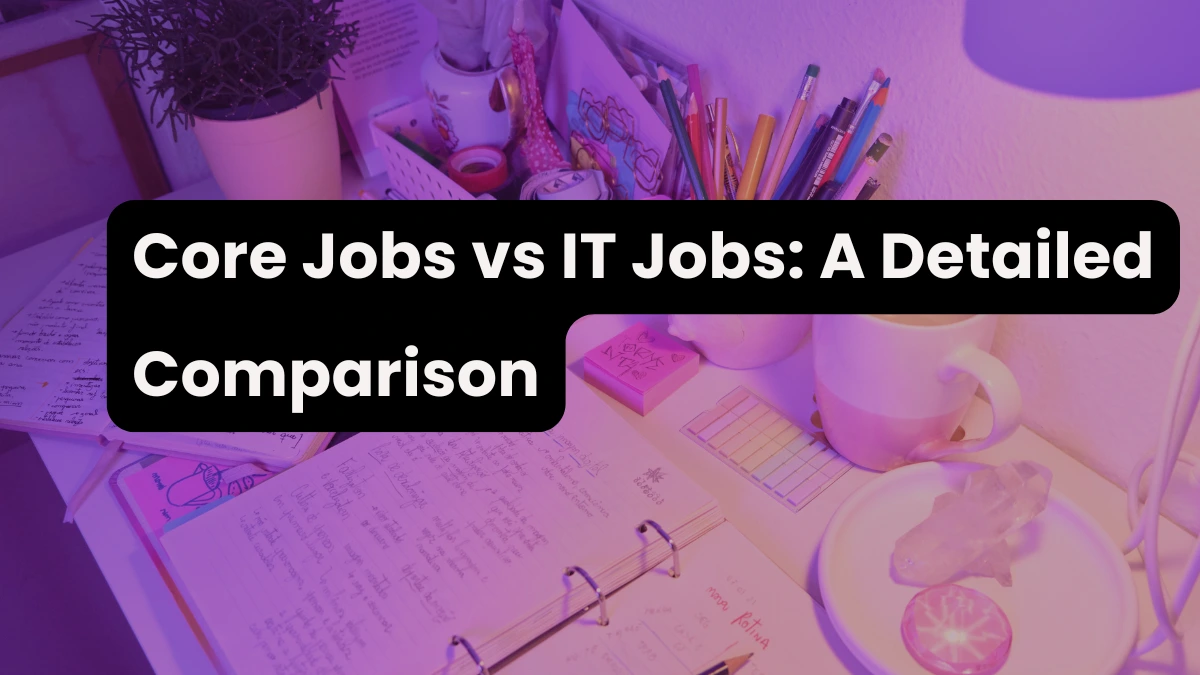Core Jobs vs IT Jobs: A Detailed Comparison
Core Jobs vs IT Jobs: The Graduate Aptitude Test in Engineering (GATE) has long been considered one of the most prestigious examinations for engineering graduates in India. A good GATE score opens doors to Public Sector Undertakings (PSUs), higher education in premier institutes (IITs/IISc/NITs), and research organizations.
However, many aspirants find themselves at a crossroads: Should they pursue core engineering jobs through GATE or enter the rapidly growing Information Technology (IT) sector through campus or off-campus placements?
Both paths have unique advantages, challenges, and long-term career implications. This blog presents a detailed comparison to help you make an informed decision.
Core Jobs through GATE
Core jobs generally include employment in:
- PSUs such as NTPC, ONGC, BHEL, GAIL, IOCL
- Research institutions like CSIR, DRDO, and ISRO
- Higher education and teaching after M.Tech/PhD.
Key Highlights:
- High job security (especially in PSUs and Govt. research labs)
- Competitive perks (housing, medical, pension)
- Opportunities to work in nation-building projects

IT Jobs (Campus/Off-campus Placements)
IT jobs broadly fall into:
- Service-based companies (Infosys, TCS, Wipro, Cognizant)
- Product-based companies (Google, Microsoft, Amazon, Adobe)
- Startups and emerging tech firms
Key Highlights:
- Faster salary growth and global exposure
- Flexible work culture, remote opportunities
- Requires continuous upskilling in coding, data, AI, and new tech stacks
Core vs IT: Tabular Comparison
| Aspect | Core Jobs (via GATE) | IT Jobs (Campus/Off-campus) |
| Entry Path | GATE exam score → PSU/Research/Higher Studies | Coding rounds, aptitude tests, HR interviews |
| Fields of Work | Civil, Mechanical, Electrical, Chemical, R&D | Software Development, IT Services, AI/ML, Cloud |
| Job Security | Very high in PSUs/Govt. jobs | Moderate; layoffs possible in the private sector |
| Salary Range | ₹8–18 LPA (PSUs), ₹6–12 LPA (Research/Academia) | ₹4–7 LPA (Service firms), ₹10–25+ LPA (Product firms) |
| Growth | Steady, seniority-based | Fast, performance-driven |
| Skill Requirement | Strong technical fundamentals, domain knowledge | Programming, adaptability, continuous learning |
| Location | Industrial plants, project sites, research labs | IT hubs (Bengaluru, Hyderabad, Pune, Gurugram) |
| Work-Life Balance | Generally good in PSUs; moderate at project sites | Varies: good in some MNCs, tough in startups/product firms |
| Prestige/Perception | Prestigious, nation-building, secure | Modern, global exposure, flexible |
| Future Opportunities | R&D, teaching, Govt. administration | Startups, freelancing, international mobility |
Read More: Powergrid Engineer Trainee Recruitment
Core Engineering Jobs: Detailed Discussion
1. Job Security
- Core jobs (via GATE): Security is unmatched, especially in PSUs. These are permanent roles with pension benefits and low layoff risk.
- IT jobs: Riskier due to market fluctuations, but global exposure and faster career transitions are possible.
2. Salary and Perks
- Core: PSU packages often include allowances, housing, and medical perks, making the effective salary higher than the base pay.
- IT: Salaries vary widely. Service firms start lower, but product-based firms and startups offer lucrative packages quickly.
3. Skill Demand
- Core: Mastery of engineering fundamentals, field-specific expertise, and problem-solving.
- IT: Focus on coding, algorithms, cloud computing, and adaptability to rapidly changing technologies.
4. Work-Life Balance
- Core: PSU jobs are known for 9-to-5 schedules. Private core companies and site jobs can be more demanding.
- IT: Balance depends on company culture. Service firms often offer stable hours, while product/startup jobs can be high-pressure.
5. Growth and Promotions
- Core: Slower, often seniority-based, with fixed pay scales.
- IT: Performance-driven. Promotions and salary hikes can be rapid for high performers.
Read More: BEL Trainee Engineer Recruitment
Core Jobs vs IT Jobs: Which One Should You Choose?
Your decision depends on personal priorities:
✅ Choose Core Jobs if:
- You want job security, a steady lifestyle, and government benefits.
- You are passionate about your core engineering discipline.
- You prefer contributing to nation-building projects.
✅ Choose IT Jobs if:
- You aim for high salary growth and global opportunities.
- You are comfortable with continuous learning and adapting to new tech.
- You enjoy working in urban, tech-driven environments.
Core Jobs vs IT Jobs: Conclusion
Both core jobs via GATE and IT jobs are rewarding, but in different ways:
- Core jobs offer stability, prestige, and long-term security.
- IT jobs provide dynamic growth, higher salaries, and global opportunities.
👉 The best choice depends on your career vision, risk appetite, and interests. Some students even blend both worlds — starting in IT for exposure and later pursuing higher studies or PSUs through GATE.
Ultimately, the right decision is the one that aligns with your passion, lifestyle goals, and long-term aspirations.
Read More: Top M.Tech Colleges in India
Core Jobs vs IT Jobs: FAQs
What are core engineering jobs, and how do they differ from IT jobs?
Core engineering jobs typically involve roles in PSUs, research organizations, and technical fields such as civil, mechanical, and electrical engineering, where expertise in engineering fundamentals is required. In contrast, IT jobs focus on software development, programming, and tech innovation, mostly in service/product-based companies, and demand adaptability to new technologies.
Which entry path should I choose for core jobs vs IT jobs?
To pursue core engineering jobs, a strong GATE score is mandatory for entry into PSUs or research institutions. For IT jobs, candidates are selected through coding rounds, aptitude tests, and interviews, either via campus or off-campus placements.
Are core jobs more secure than IT jobs?
Yes, job security in core roles—especially within PSUs and government research labs—is typically higher, with permanent positions and pension benefits. IT jobs can offer faster growth and global exposure, but the private sector may face layoffs due to market shifts.
How do salary ranges compare between core jobs and IT jobs?
Core jobs through GATE (PSUs, research, academia) offer salary packages ranging from ₹6–18 LPA, often including perks such as housing and medical allowances. IT jobs start from ₹4–7 LPA in service firms and can exceed ₹25 LPA in product-based or startup roles, with rapid increases based on performance.
What skill sets are required for success in core jobs vs IT jobs?
Core jobs demand deep domain knowledge, strong technical fundamentals, and problem-solving abilities. IT jobs require proficiency in coding, continuous learning, and adapting to evolving tech stacks like AI, machine learning, and cloud computing.
What kind of work-life balance can I expect in core jobs versus IT jobs?
PSUs within core engineering often provide a stable 9-to-5 schedule and good work-life balance, while private sector roles or project sites may be more demanding. IT companies vary—service firms are stable, but product firms and startups might involve high-pressure and longer work hours.
Which path offers better future opportunities and growth?
Core engineering jobs offer steady, seniority-based growth and lead to opportunities in research, teaching, and government administration. IT jobs are performance-driven, with faster promotions, greater international mobility, and potential for freelancing or startup ventures.
Should I choose core jobs or IT jobs?
Opt for core jobs if your priorities include job security, a steady lifestyle, and government benefits. Choose IT jobs for dynamic salary growth, technological innovation, and global career prospects, especially if continual skill upgrading excites you.
Can graduates combine both career paths?
Some professionals start in IT jobs for initial exposure and higher salaries, then pursue higher studies or transition to core roles in PSUs through GATE later in their careers. Blending skillsets from both domains can open broader career possibilities.







